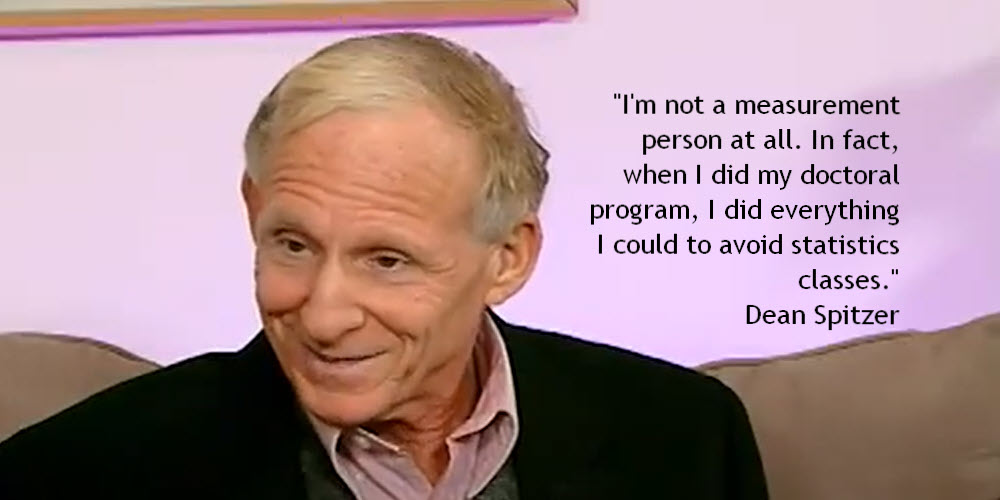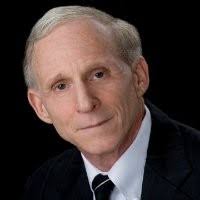There are only four books on performance measurement that I recommend to peers. My favorite is Transforming Performance Measurement by Dean Spitzer. Dean started his performance measurement journey while doing research at IBM. Like many innovators, he first found out what didn’t work. Ultimately, he discovered the four performance measurement success factors.
The Interview with Dean Spitzer
Ten Big Ideas
- Training alone does not improve organizational performance
- Changing the measurement system precedes organizational change
- The strongest quadrant in the balanced scorecard
- The 4 Critical Success Factors of Transformational Performance Measurement
- The dark side of measurement
- The 10-30-60 Rule
- The Chief Measurement Officer
- Exploratory vs confirmatory measurement
- Transactional vs Experience measurement
- The IPOO Model

The Socialization of Measurement
According to Dean, organizational change can occur only if we change the measurement system. He calls this program of research, the socialization of measurement because he found that no matter what you did with the technical aspects of measurement, it would never work unless you got people to adopt it to be enthusiastic about measuring. You can’t just impose it upon them. Otherwise, they’re just going to play the game.
The Four Critical Success Factors of Performance Measurement
The first factor is context – to create an environment that fosters the positive use of measurement. Measurement can be used negatively or positively. And most of the time, it’s used negatively against people.
The second factor is focusing on the right things. The right things are those that drive optimal value.
The third factor is integration, aligning measurement, and value creation across the entire organization. Too many organizations are misaligned where different functions have different measurement systems.
The fourth factor is interactivity which is creating the right dialogue around measurement that promotes value creation, learning, and continuous improvement so that people are caring. This is about creating a measurement system improving the measurement system, and dialoguing about measurement.
The Dark Side of Measurement
According to Dean, the dark side of measurement is simply measuring the wrong things. And often doing so for the wrong reasons. The case study Dean discusses is what happened at Wells Fargo.
Technical Infrastructure is Not the Main Thing
Probably 90% of the investment is in the technical infrastructure. And there’s hardly any investment in developing the measurement process, and improving others which include training people, motivating people, creating the right attitudes about measurement, developing capabilities, measurement, education, and communications around measurement.
The real missing link is measurement leadership. There’s no measurement leadership, and it’s often delegated to the technical people. I’ve never seen an organization that had a chief measurement officer.
The Problem with Net Promoter Score
- It doesn’t tell you very much that’s actionable. It can only really be used by a highly mature organization that’s basically looking for confirmation that they’re doing the right things.
- One of the things I talked about in the book is the difference between exploratory measurement and confirmatory measurement. Exploratory measurement is much more important because that’s what’s going to make the organization more intelligent and increase what I call organizational wisdom.
- Customer satisfaction is transactional. And it’s usually done at a point in time. So it doesn’t really give you any indication of how to improve the overall customer experience.
What is the IPOO Model?
- Inputs
- Process
- Outputs
- Outcomes
And we know so many examples of companies that generate lots of output, but don’t produce much value. So to me, the focus should always be on outcomes and value. Then you can work backwards based on that value that we want to create, then ask what are the outputs we need to produce?
Next, what is the process and then what are the inputs? But what we tend to do is to measure the inputs, the process, and the outputs, because they’re all easy to measure. And you don’t have to think about them.
Dean Spitzer
Mark’s Favorite Foundational Books on Performance Measurement




The above books on performance measurement are foundational, start there first. While I like The Balanced Scorecard, Dean’s four pillars are never addressed. That’s why companies have failed in adopting The Balanced Scorecard after spending millions to do so.
Still, it’s an important book and should be read after the titles above.
The other books I mentioned during the interview included:
- Any book by Steve Blank as he does the best job at describing value creation in my opinion
- Understanding Variation: The Key to Managing Chaos
- Measures of Success
Other Titles to Consider –
- SuperMotivation by Dean Spitzer
- Supportive Accountability by Sylvia Melena
- Next Performance Management by Alan Colquitt
Who Is Dean Spitzer?
We already know that Dean has written the best foundational book on performance measurement.
Today, he is working pro bono for churches and Bible colleges. He’s on the board of advisors and a visiting professor at a new Bible college in Nepal.
He teaches at Charis Bible College in Colorado and does a lot of remote consulting for churches and colleges, mostly in the spiritual arena.
Additionally –
- he’s been an organizational development and business transformation professor, consultant, and researcher for more than 40 years
- he’s been a professor at 5 universities
- he served as an internal and external consultant for IBM and for several other Fortune 100 companies
- he’s published 8 books and more than 200 articles and book chapters
- he’s given more than 100 keynotes
- he earned his Ph.D. from the University of Southern California

A special thanks to Dean for doing this interview. One word – phenomenal.

I listened to the complete interview and found the conversations absolutely fascinating. Mark Gandy has done a wonderful job by raising important questions and providing expert comments on the answers given the Guru of performance measurement Dr. Dean Spitzer who made a compelling case for measuring the right things relating to the value creation model of the organization. This is a great interview and I thank you both Mark and Dean for your tremendous contributions.